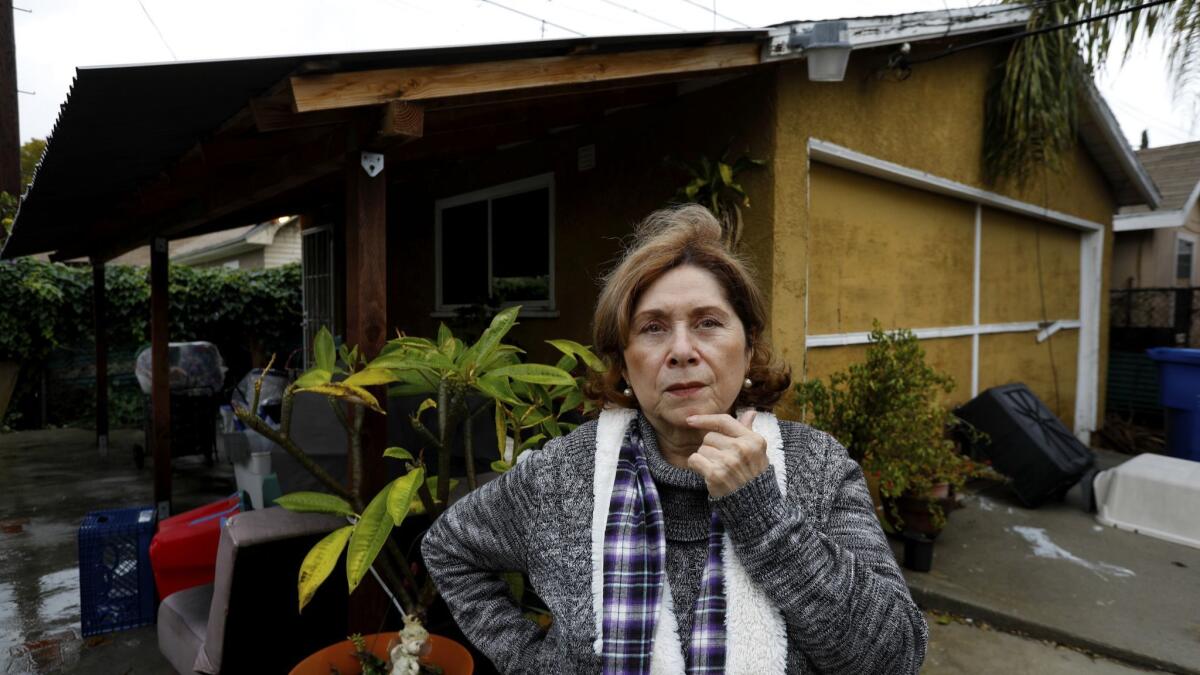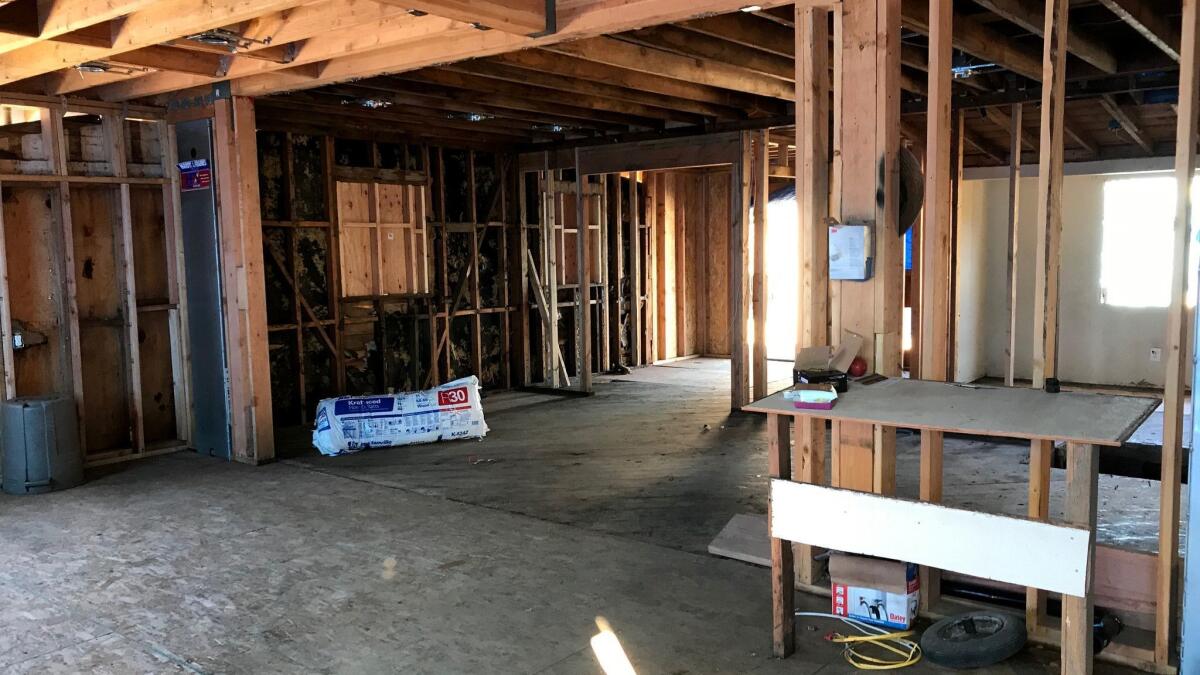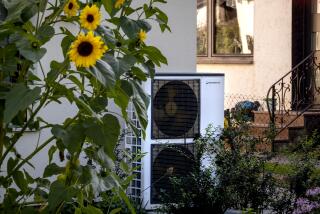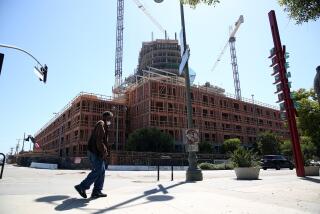A loan program was set up to boost energy efficiency. Instead, it’s being used to build ‘granny flats’

As stories piled up of homeowners being smooth-talked into taking home improvement loans they couldn’t afford, defenders of the PACE program cited its safety features.
The loans could be used only for environmentally friendly and safety projects, they noted. And money couldn’t be issued until projects were finished.
But some contractors apparently dance around both rules, as shown by the recent collapse of two firms.
Homeowners contacted by The Times say those companies used PACE, or Property Assessed Clean Energy, loans to fund questionable projects that included ineligible work on “granny flat” accessory units and encouraged them to provide false information on loan documents or in phone calls with lenders. They said the companies never finished the work, and some worry they’ll now lose their house over loans they never should have obtained in the first place.
Consumer attorneys say they frequently come across other contractors who use PACE financing for non-approved work and say the cases highlight a major flaw in the programs: Even after legislative efforts to increase oversight, contractors still wield too much power to sign up homeowners for loans that, if unpaid, can lead to foreclosure.
“It smacks of what was going on ... with subprime [home] loans,” said John Rao, an attorney with the National Consumer Law Center.
PACE programs launched last decade with the lofty goal of combating climate change by allowing more people to fund energy efficiency improvements. The programs are established by government bodies, most of which contract with private lenders to run and fund them.
Over the years, the state Legislature has expanded PACE to allow it to be used for other items that serve a greater good, including earthquake retrofitting and wildfire protection. Since 2015, PACE programs in California have generated loans worth more than $4 billion, according to the state treasurer.
The big fear I have is all these homeowners are going to be swept in on the bankruptcy and are stuck ... getting pennies on the dollar.
— Michael McCollum, attorney
One could argue that government-authorized loans to create more housing units qualify as a greater good. California has encouraged the construction of secondary units to help ease the state’s housing crisis, by eliminating some local restrictions. But financing can be difficult to find. The Western Riverside Council of Governments, which oversees the state’s largest PACE program, said lenders have inquired about using PACE for those “granny flats,” but the agency decided state law wouldn’t support it.
That apparently hasn’t stopped some contractors. Five homeowners told The Times that Green Nation Direct signed them up for PACE loans to fund conversions of their garages into backyard homes and coaxed or pressured them into providing false information to lenders, including to say work was completed.
Brisas Zapata of Jefferson Park said a Green Nation Direct worker put her on a call with a lender without first saying what they would ask or telling her the loan wasn’t supposed to be used for a garage conversion. She recalled the contractor then pleading with her to say yes to a series of questions.
“I was so nervous, [thinking] this is not right,” Zapata, 65, said. “But [afterward] he assured me that’s the way it worked.”
Homeowners said they took out loans with the assumption that the rent on an additional unit would help pay off their new debts. Some allege the company, without their knowledge, provided false information about their income to lenders. They described the process of signing up for loans as fast and confusing; some didn’t even remember signing documents.
Green Nation Direct declared bankruptcy in November, and five homeowners told The Times they are on the hook for loans and construction workers have abandoned projects midway or never started.
“What am I going to do?” said Jorge Hernandez of Granada Hills. Hernandez, a bail bondsman, said he’s nearly maxed out his credit cards and borrowed money from family to clean up the mess Green Nation Direct left behind on a garage conversion and home remodeling.
He worries he’ll lose his home and recently went to the hospital because of the stress. “I felt like I was having a heart attack.”
Camilo Uribe, listed in state records as Green Nation Direct’s chief executive, declined to comment by email after The Times sent him a detailed list of questions. The company’s bankruptcy attorneys and Raul Segovia, listed as president and chief executive in bankruptcy documents, did not return emails.
Joe Delgado of community group Alliance of Californians for Community Empowerment, which is helping homeowners, said others are stuck with loans and unfinished work after another company, Eco Solar Home Improvement, signed them up for PACE to fund garage conversions and then went out of business.
Eco Solar could not be reached for comment. The company website is down and its phone number goes to a Google Voice number. No one responded to four voicemails left there with descriptions of homeowner allegations.
At least 70 people who hired the two companies for garage conversions now have PACE loans and projects that never started or were abandoned, Delgado said.
Some homeowners, he said, were left completely in the dark about what the companies were really doing. “It’s outrageous,” he said.
In the wake of homeowner complaints, multiple lenders — Energy Efficient Equity, PACE Funding and Ygrene Energy Fund — said they are investigating work by Green Nation Direct and Eco Solar and, in some cases, canceling loans.
Homeowners shared documentation with The Times that showed Green Nation Direct and Eco Solar would turn their garages into accessory dwelling units — even though their PACE loan documents were only for energy and water efficiency products.
Lenders say they try to ensure that loans are used for legally authorized items and that work is completed by requiring consumers sign disclosure statements and completion certifications, as well as through live phone calls with consumers that are recorded.
One of the finance companies, Energy Efficient Equity, or E3, said it now requires a third-party, in-person inspection before the loan is issued to ensure money is being used for approved items and the project is finished.
“It appears that these contractors, both of whom have gone out of business, misrepresented information to the homeowners and to E3,” the company said in a statement. “In some cases, it appears that homeowners may also have been responsible for reporting false information to E3.”
Ygrene said that it made “whole” one homeowner. E3 said it’s willing to cancel loans or fund partially completed work if it’s for approved items. It did not respond when asked if it would refund homeowners for PACE payments already made.
PACE Funding said it already calls all homeowners to confirm a job is done and it’s now exploring whether it is “feasible” to inspect every project before funds are issued. It said it is working to “assist the homeowners and their attorneys to recoup any losses,” though two homeowners said they can’t get the company to cancel the loans.

“The big fear I have is all these homeowners are going to be swept in on the bankruptcy and are stuck ... getting pennies on the dollar while the lenders turn around and say you owe us the full amount of the loan,” said attorney Michael McCollum, who is representing about a dozen former Green Nation Direct clients, including Zapata and Hernandez.
Under California law, the loans can be used only for items that generate renewable energy, save energy or water, or protect against earthquakes or wildfires, according to the state’s Department of Business Oversight. Homeowners can also install an electric-car charging station.
Homeowners borrow against their home’s equity, and loans are repaid through property tax bills.
Not long after the program began, homeowners and consumer groups alleged contractors were signing up people for loans they never understood and couldn’t afford. State laws went into effect last year to increase industry oversight. One required that lenders check incomes and make sure borrowers are able to repay loans. Another mandated that lenders call consumers to make sure they understand loans.
The laws left neither side satisfied. Some PACE companies, while initially supportive, argue they block too many qualified applicants. Consumer groups said contractors still wield too much control.
For example, the laws do not require inspections of all projects to make sure they are for approved work only and that the work is finished. They also don’t require a phone call with every homeowner to confirm completion.
Los Angeles City Councilman Bob Blumenfield, a supporter of PACE, said some homeowners may bear partial responsibility for false statements. But he expressed concern that people were being taken advantage of and wants to look into whether the city should improve its PACE oversight.
Attorney Nicholas Levenhagen said his pro bono law firm, Bet Tzedek, frequently sees cases in which contractors tell homeowners PACE will fund ineligible improvements such as interior paint or wheelchair ramps for senior citizens, but don’t tell them it’s not allowed. The contractor submits loans for expensive products that are allowed, but the homeowner didn’t ask for, Levenhagen said. Sometimes work is completed; sometimes it isn’t.
The Western Riverside Council of Governments does not require in-person inspection on every project, but it does mandate that a sample of projects are checked after completion. Casey Dailey, director of energy and environmental programs, called the association’s oversight robust. In addition to lender phone calls with homeowners, WRCOG follows up to make sure consumers understand the loan terms.
Dailey said the agency has its own compliance staff that reviews every contract prior to funding. He cited an application Green Nation Direct submitted last year, for a heating and air conditioning unit, insulation, doors and windows. Puzzled over the high cost and combination of items, Dailey said, the council asked for more information but never heard back. The loan didn’t go through.
“It appeared there might have been product stuffing,” Dailey said. WRCOG’s lender partner, Renovate America, canceled its relationship with Green Nation Direct after the application, said Dailey, who maintained that such cases are rare.
According to multiple government bodies with PACE programs, it’s possible to use the loans for some items homeowners might want or need in a garage conversion — say, a low-flush toilet or energy-efficient windows. But PACE can’t fund the entire conversion, except in a rare case where the only work needed would be eligible improvements. Items not allowed include flooring, new walls and cabinetry, agencies said.
“I don’t see how you can do 100%,” said Minh Le, general manager for energy and environment services for L.A. County’s Internal Services Department.
Nonetheless, several homeowners said Green Nation Direct assured them their PACE loans would cover all or nearly all of such work.
Francisco Marin of Reseda took out two PACE loans last year — one from E3 and another from PACE Funding — totaling $130,250 for energy and water efficient items including a high-efficiency toilet and a “cool roof.” According to a Green Nation Direct contract Marin provided to The Times, which has the contractor’s signature but not his, he will pay Green Nation Direct $130,250 to build a carport and turn his garage into a two-bedroom unit with cabinets, closets and flooring.
On a phone call, Marin told PACE Funding there was no work left to be done, but he said he thought the lender had asked him about blueprints and plans, because that’s what Green Nation Direct told him they would ask about.
Marin said he and his brother, who co-owns the home, spent about $50,000 of their own money to finish the job construction workers abandoned.
In a brief interview, Manny Orellana, a former Green Nation Direct salesman, said using PACE for accessory dwelling units (ADUs) is common in the industry. He declined to name other companies.
Orellana said Uribe, the Green Nation Direct chief executive, told him the company was working with E3 “to come up with programs that would finance ADUs.” Uribe, according to Orellana, discussed with the company’s sales team having customers tell PACE lenders that incomplete work had been finished, to pre-fund deals.
Orellana said he left the company because he was uncomfortable with how Uribe conducted business.
Asked if E3 knew Green Nation Direct was using PACE for unapproved items and encouraged homeowners to provide false information, that company declined to comment. PACE Funding and Ygrene said they weren’t aware their financing was used for funding unapproved items or that contractors pressured consumers to provide false information.
Hernandez, the Granada Hills homeowner, said Uribe told him Green Nation Direct would finance most of his work through PACE and they’d both tell lenders the money was going toward energy saving. Hernandez said Uribe told him “this is how we do things,” and that lenders know contractors inflate and put in for different work so they can get money for construction.
Later, Hernandez said Uribe asked him to tell lenders energy efficiency items were installed so Green Nation Direct could get the money and finish the real job.
“He said this is common practice,” Hernandez recalled. “So I said, ‘OK.’ I didn’t think anything of it.”
Follow me @khouriandrew on Twitter







